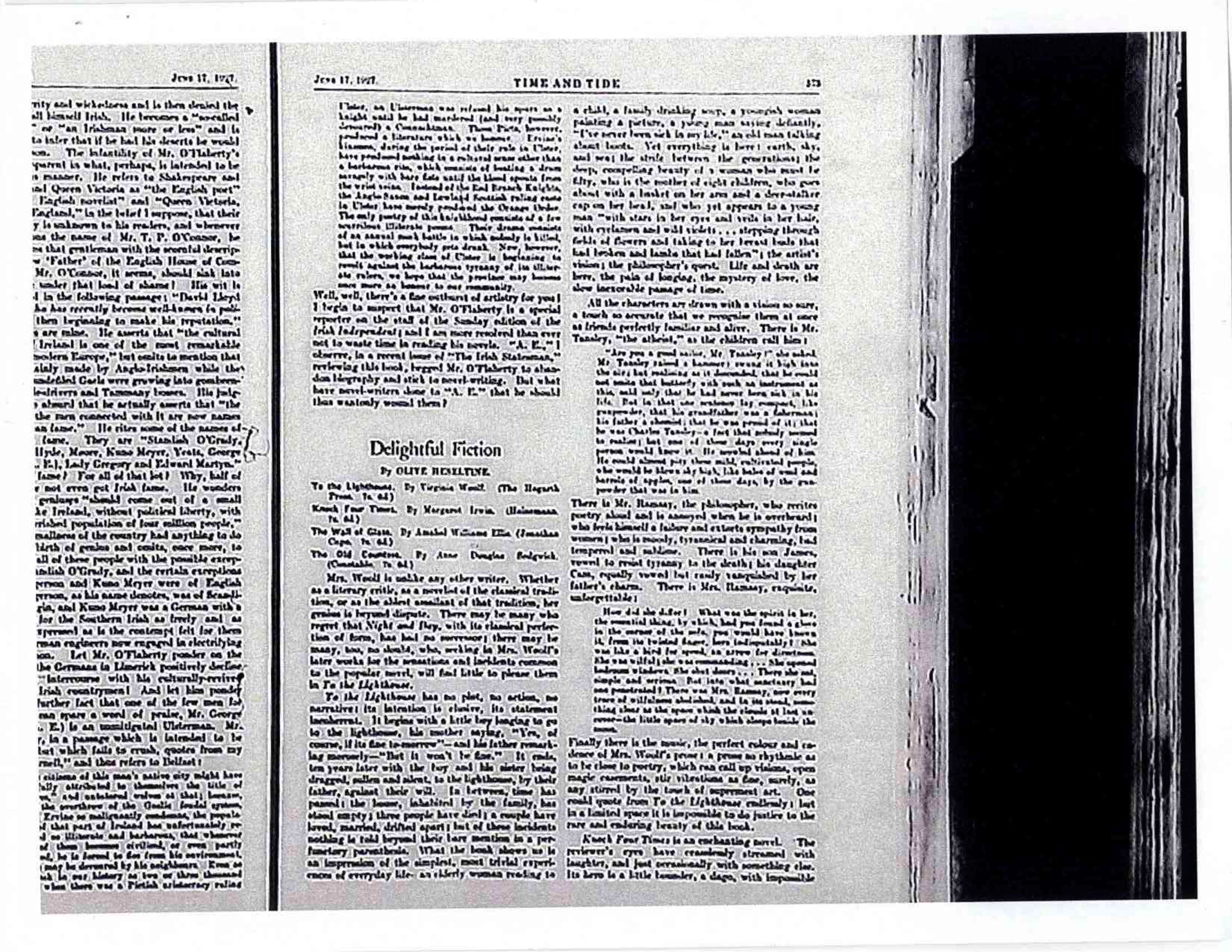
Olive Heseltine, “Delightful Fiction.” Time and Tide. June 17, 1927, p.573.
Delightful Fiction
By OLIVE HESELTINE.
To the Lighthouse. By Virginia Woolf. (The Hogarth
Press. 7s. 6d.)
Knock Four Times. By Margaret Irwin. (Heinemann.
7s. 6d.)
The Old Countess. By Anne Douglas Sedgwick.
(Constable. 7s. 6d.)
Mrs. Woolf is unlike any other writer. Whether
as a literary critic, as a novelist of the classical tradition,
or as the ablest assailant of that tradition, her
genius is beyond dispute. There may be many who
regret that Night and Day, with its classical perfection
of form, has had no successor; they may be
many, too, no doubt, who, seeking in Mrs. Woolf’s
later works for the sensations and incidents common
to the popular novel, will find little to please them
in To the Lighthouse.
To the Lighthouse has no plot, no action, no
narrative: its intention is elusive, its statement
incoherent. It begins with a little boy longing to go
to the lighthouse, his mother saying, “Yes, of
course, if its fine to-morrow”—and his father remarking
morosely—“But it won’t be fine.” It ends,
ten years later with the boy and his sister being
dragged, sullen and silent, to the lighthouse, by their
father, against their will. In between, time has
passed: the house, inhabited by the family, has
stood empty; three people have died; a couple have
loved, married, drifted apart; but of these incidents
nothing is told beyond their bare mention in a perfunctory
parenthesis. What the book shows us is
an impression of the simplest, most trivial experiences
of everyday life—an elderly woman reading to
[new column]
a child, a family drinking soup, a youngish woman
painting a picture, a young man saying defiantly,
“I’ve never been sick in my life,” an old man talking
about boots. Yet everything is here: earth, sky,
and sea; the strife between the generations; the
deep, compelling beauty of a woman who must be
fifty, who is the mother of eight children, who goes
about with a basket on her arm and a deer-stalker
cap on her head, and who yet appears to a young
man “with stars in her eyes and veils in her hair,
with cyclamen and wild violets . . . stepping through
fields of flowers and taking to her breast buds that
had broken and lambs that had fallen”; the artist’s
vision; the philosopher’s quest. Life and death are
here, the pain of longing, the mystery of love, the
slow inexorable passage of time.
All the characters are drawn with a vision so sure,
a touch so accurate that we recognise them at once
as friends perfectly familiar and alive. There is Mr.
Tansley, “the atheist,” as the children call him:
“Are you a good sailor, Mr. Tansley?” she asked.
Mr. Tansley raised a hammer: swung it high into
the air; but realising as it descended, that he could
not smite that butterfly with such an instrument as
this, said only that he had never been sick in his
life. But in that one sentence lay compact, like
gunpowder, that his grandfather was a fisherman;
his father a chemist; that he was proud of it; that
he was Charles Tansley—a fact that nobody seemed
to realise; but one of these days every single
person would know it. He scowled ahead of him.
He could almost pity these mild, cultivated people,
who would be blown sky high, like bales of wool and
barrels of apples, one of these days, by the gunpowder
that was in him.
There is Mr. Ramsay, the philosopher, who recites
poetry aloud and is annoyed when he is overheard;
who feels himself a failure and extorts sympathy from
women; who is moody, tyrannical and charming, bad
tempered and sublime. There is his son James,
vowed to resist tyranny to the death; his daughter
Cam, equally vowed but easily vanquished by her
father’s charm. There is Mrs. Ramsay, exquisite,
unforgettable:
How did she differ? What was the spirit in her,
the essential thing, by which, had you found a glove
in the corner of the sofa, you would have known
it, from its twisted finger, hers indisputably? She
was like a bird for speed, an arrow for directness.
She was wilful; she was commanding . . . She opened
bedroom windows. She shut doors . . . There she sat,
simple and serious. But into what sanctuary had
one penetrated? There was Mrs. Ramsay, now every
trace of wilfulness abolished, and in its stead, something
clear as the space which the clouds at last uncover—
the little space of sky which sleeps beside the
moon.
Finally there is the music, the perfect colour and cadence
of Mrs. Woolf’s prose: a prose so rhythmic as
to be close to poetry, which can call up visions, open
magic casements, stir vibrations as fine, surely, as
any stirred by the touch of supremest art. One
could quote from To the Lighthouse endlessly: but
in a limited space it is impossible to do justice to the
rare and enduring beauty of this book.
Knock Four Times is an enchanting novel. The
reviewer’s eyes have ceaselessly streamed with
laughter, and just occasionally with something else.
Its hero is a little bounder, a dago, with impossible
[This review obviously continues, but only this page is available in the scan from ILL]






